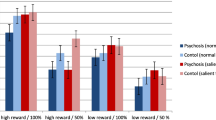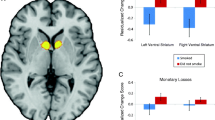Abstract
Rationale
A reduced willingness to perform effort based on the magnitude and probability of potential rewards has been associated with diminished dopamine function and may be relevant to chronic drug use.
Objectives
Here, we investigated the influence of smoking status on effort-based decisions. We hypothesized that smokers would make fewer high-effort selections than ex-smokers and never-smokers.
Methods
Current smokers (n = 25), ex-smokers (≥ 1 year quit, n = 23), and never-smokers (n = 19) completed the Effort Expenditure for Rewards Task in which participants select between low-effort and high-effort options to receive monetary rewards at varying levels of reward magnitude, probability and expected value.
Results
Overall, participants selected more high-effort options as potential reward magnitude and expected value increased. Smokers did not make fewer high-effort selections overall, but smokers were less sensitive to the changes in magnitude, probability, and expected value compared to never-smokers. Smokers were also less sensitive to the changes in probability and expected value, but not magnitude, compared to ex-smokers. Among smokers and ex-smokers, less nicotine dependence was associated with an increased likelihood of high-effort selections.
Conclusions
These results demonstrate the relevance of smoking status to effort-based decisions and suggest that smokers have diminished sensitivity to nondrug reward value. Among ex-smokers, greater pre-existing sensitivity to reward value may have been conducive to smoking cessation, or sensitivity was improved by smoking cessation. Future prospective studies can investigate whether effort-related decision making is predictive of smoking initiation or cessation success.
Implications
Willingness to perform effort to achieve a goal and sensitivity to changes in reward value are important aspects of motivation. These results showed that smokers have decreased sensitivity to changes in effort-related reward probability and expected value compared to ex-smokers and never-smokers. Potentially, improved sensitivity to rewards among ex-smokers may be a cause or consequence of smoking cessation. These findings may help explain why some smokers are able to achieve long-term abstinence.



Similar content being viewed by others
References
Al-Adawi S, Powell J (1997) The influence of smoking on reward responsiveness and cognitive functions: a natural experiment. Addiction 92:1773–1782. https://doi.org/10.1046/j.1360-0443.1997.9212177318.x
Ashok AH, Mizuno Y, Howes OD (2019) Tobacco smoking and dopaminergic function in humans: a meta-analysis of molecular imaging studies. Psychopharmacology 236:1119–1129. https://doi.org/10.1007/s00213-019-05196-1
Assadi SM, Yucel M, Pantelis C (2009) Dopamine modulates neural networks involved in effort-based decision-making. Neurosci Biobehav Rev 33:383–393. https://doi.org/10.1016/j.neubiorev.2008.10.010
Bailey MR, Simpson EH, Balsam PD (2016) Neural substrates underlying effort, time, and risk-based decision making in motivated behavior. Neurobiol Learn Mem 133:233–256. https://doi.org/10.1016/j.nlm.2016.07.015
Baker TB, Piper ME, McCarthy DE, Bolt DM, Smith SS, Kim SY, Colby S, Conti D, Giovino GA, Hatsukami D, Hyland A, Krishnan-Sarin S, Niaura R, Perkins KA, Toll BA (2007) Time to first cigarette in the morning as an index of ability to quit smoking: implications for nicotine dependence. Nicotine Tob Res 9(Suppl 4):S555–S570. https://doi.org/10.1080/14622200701673480
Barch DM, Treadway MT, Schoen N (2014) Effort, Anhedonia, and function in schizophrenia: reduced effort allocation predicts Amotivation and functional impairment. J Abnorm Psychol 123:387–397. https://doi.org/10.1037/a0036299
Beeler JA (2012) Thorndike's law 2.0: dopamine and the regulation of thrift. Frontiers in. Neuroscience 6. https://doi.org/10.3389/fnins.2012.00116
Beeler JA, Frazier CR, Zhuang X (2012) Putting desire on a budget: dopamine and energy expenditure, reconciling reward and resources. Front Integr Neurosci 6:1–22. https://doi.org/10.3389/fnint.2012.00049
Bickel WK, Odum AL, Madden GJ (1999) Impulsivity and cigarette smoking: delay discounting in current, never, and ex-smokers. Psychopharmacology 146:447–454. https://doi.org/10.1007/PL00005490
Bickel WK, Johnson MW, Koffarnus MN, MacKillop J, Murphy JG (2014) The behavioral economics of substance use disorders: reinforcement pathologies and their repair. Annu Rev Clin Psychol 10(10):641–677. https://doi.org/10.1146/annurev-clinpsy-032813-153724
Caul WF, Brindle NA (2001) Schedule-dependent effects of haloperidol and amphetamine: multiple-schedule task shows within-subject effects. Pharmacol Biochem Behav 68:53–63. https://doi.org/10.1016/S0091-3057(00)00431-7
Dagher A, Bleicher C, Aston JA, Gunn RN, Clarke PB, Cumming P (2001) Reduced dopamine D1 receptor binding in the ventral striatum of cigarette smokers. Synapse 42:48–53. https://doi.org/10.1002/syn.1098
Davis KL, Kahn RS, Ko G, Davidson M (1991) Dopamine in schizophrenia - a review and reconceptualization. Am J Psychiatr 148:1474–1486
de Jong JW, Roelofs TJM, Mol FMU, Hillen AEJ, Meijboom KE, Luijendijk MCM, van der Eerden HAM, Garner KM, Vanderschuren LJMJ, Adan RAH (2015) Reducing ventral tegmental dopamine D2 receptor expression selectively boosts incentive motivation. Neuropsychopharmacology 40:2085–2095. https://doi.org/10.1038/npp.2015.60
de Leon J, Diaz FJ (2005) A meta-analysis of worldwide studies demonstrates an association between schizophrenia and tobacco smoking behaviors. Schizophr Res 76:135–157. https://doi.org/10.1016/j.schres.2005.02.010
Fagerstrom K (2003) Time to first cigarette; the best single indicator of tobacco dependence? Monaldi Arch Chest Dis 59:91–94
Fehr C, Yakushev I, Hohmann N, Buchholz HG, Landvogt C, Deckers H, Eberhardt A, Klaager M, Smolka MN, Scheurich A, Dielentheis T, Schmidt LG, Rosch F, Bartenstein P, Grunder G, Schreckenberger M (2008) Association of low striatal dopamine D-2 receptor availability with nicotine dependence similar to that seen with other drugs of abuse. Am J Psychiatr 165:507–514. https://doi.org/10.1176/appi.ajp.2007.07020352
Floresco SB, Tse MTL, Ghods-Sharifi S (2008) Dopaminergic and glutamatergic regulation of effort- and delay-based decision making. Neuropsychopharmacology 33:1966–1979. https://doi.org/10.1038/sj.npp.1301565
Hartmann MN, Hager OM, Reimann AV, Chumbley JR, Kirschner M, Seifritz E, Tobler PN, Kaiser S (2015) Apathy but not diminished expression in schizophrenia is associated with discounting of monetary rewards by physical effort. Schizophr Bull 41:503–512. https://doi.org/10.1093/schbul/sbu102
Hosking JG, Lam FC, Winstanley CA (2014) Nicotine increases impulsivity and decreases willingness to exert cognitive effort despite improving attention in "slacker" rats: insights into cholinergic regulation of cost/benefit decision making. PLoS One 9:e111580. https://doi.org/10.1371/journal.pone.0111580
Huang J, Yang XH, Lan Y, Zhu CY, Liu XQ, Wang YF, Cheung EFC, Xie GR, Chan RCK (2016) Neural substrates of the impaired effort expenditure decision making in schizophrenia. Neuropsychology 30:685–696. https://doi.org/10.1037/neu0000284
Hughes JR, Budney AJ, Muellers SR, Lee DC, Callas PW, Sigmon SC, Fingar JR, Priest J (2017) Does tobacco abstinence decrease reward sensitivity? A human laboratory test. Nicotine Tob Res 19:677–685. https://doi.org/10.1093/ntr/ntw204
Inzlicht M, Shenhav A, Olivola CY (2018) The effort paradox: effort is both costly and valued. Trends Cogn Sci 22:337–349. https://doi.org/10.1016/j.tics.2018.01.007
Kendler KS, Neale MC, Maclean CJ, Heath AC, Eaves LJ, Kessler RC (1993) Smoking and major depression - a causal-analysis. Arch Gen Psychiatry 50:36–43
Klein-Flugge MC, Kennerley SW, Saraiva AC, Penny WD, Bestmann S (2015) Behavioral modeling of human choices reveals dissociable effects of physical effort and temporal delay on reward devaluation. PLoS Comput Biol 11. UNSP e1004116. https://doi.org/10.1371/journal.pcbi.1004116
Kozlowski LT, Porter CQ, Orleans CT, Pope MA, Heatherton T (1994) Predicting smoking cessation with self-reported measures of nicotine dependence - Ftq, Ftnd, and Hsi. Drug Alcohol Depend 34:211–216
Kurniawan IT, Guitart-Masip M, Dolan RJ (2011) Dopamine and effort-based decision making. Front Neurosci:5. https://doi.org/10.3389/fnins.2011.00081
Le Heron C, Plant O, Manohar S, Ang YS, Jackson M, Lennox G, Hu MT, Husain M (2018) Distinct effects of apathy and dopamine on effort-based decision-making in Parkinson's disease. Brain 141:1455–1469. https://doi.org/10.1093/brain/awy110
Leventhal AM, Piper ME, Japuntich SJ, Baker TB, Cook JW (2014) Anhedonia, depressed mood, and smoking cessation outcome. J Consult Clin Psychol 82:122–129. https://doi.org/10.1037/a0035046
Liang KY, Beaty TH, Cohen BH (1986) Application of odds ratio regression-models for assessing familial aggregation from case-control studies. Am J Epidemiol 124:678–683. https://doi.org/10.1093/oxfordjournals.aje.a114441
MacKillop J, Amlung MT, Few LR, Ray LA, Sweet LH, Munafo MR (2011) Delayed reward discounting and addictive behavior: a meta-analysis. Psychopharmacology 216:305–321. https://doi.org/10.1007/s00213-011-2229-0
Mitchell SH (1999) Measures of impulsivity in cigarette smokers and non-smokers. Psychopharmacology 146:455–464
Mitchell SH (2004) Effects of short-term nicotine deprivation on decision-making: delay, uncertainty and effort discounting. Nicotine Tob Res 6:819–828
Nestler EJ, Carlezon WA (2006) The mesolimbic dopamine reward circuit in depression. Biol Psychiatry 59:1151–1159. https://doi.org/10.1016/j.biopsych.2005.09.018
Pan W (2001) Akaike's information criterion in generalized estimating equations. Biometrics 57:120–125. https://doi.org/10.1111/j.0006-341X.2001.00120.x
Pierce RC, Kumaresan V (2006) The mesolimbic dopamine system: the final common pathway for the reinforcing effect of drugs of abuse? Neurosci Biobehav Rev 30:215–238. https://doi.org/10.1016/j.neubiorev.2005.04.016
Powell J, Dawkins L, Davis RE (2002) Smoking, reward responsiveness, and response inhibition: tests of an incentive motivational model. Biol Psychiatry 51:151–163
Rademacher L, Prinz S, Winz O, Henkel K, Dietrich CA, Schmaljohann J, Shali SM, Schabram I, Stoppe C, Cumming P, Hilgers RD, Kumakura Y, Coburn M, Mottaghy FM, Grunder G, Vernaleken I (2016) Effects of smoking cessation on presynaptic dopamine function of addicted male smokers. Biol Psychiatry 80:198–206. https://doi.org/10.1016/j.biopsych.2015.11.009
Salamone JD, Correa M, Farrar A, Mingote SM (2007) Effort-related functions of nucleus accumbens dopamine and associated forebrain circuits. Psychopharmacology 191:461–482. https://doi.org/10.1007/s00213-006-0668-9
Salamone JD, Yohn SE, Lopez-Cruz L, Miguel NS, Correa M (2016) Activational and effort-related aspects of motivation: neural mechanisms and implications for psychopathology. Brain 139:1325–1347. https://doi.org/10.1093/brain/aww050
Shiffman SM, Jarvik ME (1976) Smoking withdrawal symptoms in two weeks of abstinence. Psychopharmacology 50:35–39
Sweitzer MM, Donny EC, Dierker LC, Flory JD, Manuck SB (2008) Delay discounting and smoking: association with the Fagerstrom test for nicotine dependence but not cigarettes smoked per day. Nicotine Tob Res 10:1571–1575. https://doi.org/10.1080/14622200802323274
Treadway MT, Buckholtz JW, Schwartzman AN, Lambert WE, Zald DH (2009) Worth the ‘EEfRT'? The effort expenditure for rewards task as an objective measure of motivation and Anhedonia. PLoS One 4. ARTN e6598. https://doi.org/10.1371/journal.pone.0006598
Treadway MT, Bossaller NA, Shelton RC, Zald DH (2012) Effort-based decision-making in major depressive disorder: a translational model of motivational anhedonia. J Abnorm Psychol 121:553–558. https://doi.org/10.1037/a0028813
Treadway MT, Peterman JS, Zald DH, Park S (2015) Impaired effort allocation in patients with schizophrenia. Schizophr Res 161:382–385. https://doi.org/10.1016/j.schres.2014.11.024
Versace F, Engelmann JM, Robinson JD, Jackson EF, Green CE, Lam CY, Minnix JA, Karam-Hage MA, Brown VL, Wetter DW, Cinciripini PM (2014) Prequit fMRI responses to pleasant cues and cigarette-related cues predict smoking cessation outcome. Nicotine Tob Res 16:697–708. https://doi.org/10.1093/ntr/ntt214
Wardle MC, Treadway MT, Mayo LM, Zald DH, de Wit H (2011) Amping up effort: effects of d-amphetamine on human effort-based decision-making. J Neurosci 31:16597–16602. https://doi.org/10.1523/Jneurosci.4387-11.2011
Yang XH, Huang J, Zhu CY, Wang YF, Cheung EFC, Chan RCK, Xie GR (2014) Motivational deficits in effort-based decision making in individuals with subsyndromal depression, first-episode and remitted depression patients. Psychiatry Res 220:874–882. https://doi.org/10.1016/j.psychres.2014.08.056
Yang XH, Huang J, Lan Y, Zhu CY, Liu XQ, Wang YF, Cheung EFC, Xie GR, Chan RCK (2016) Diminished caudate and superior temporal gyrus responses to effort-based decision making in patients with first-episode major depressive disorder. Prog Neuro-Psychopharmacol Biol Psychiatry 64:52–59. https://doi.org/10.1016/j.pnpbp.2015.07.006
Yohn SE, Santerre JL, Nunes EJ, Kozak R, Podurgiel SJ, Correa M, Salamone JD (2015) The role of dopamine D-1 receptor transmission in effort-related choice behavior: effects of D-1 agonists. Pharmacol Biochem Behav 135:217–226. https://doi.org/10.1016/j.pbb.2015.05.003
Zeger SL, Liang KY (1986) Longitudinal data-analysis for discrete and continuous outcomes. Biometrics 42:121–130. https://doi.org/10.2307/2531248
Role of funding source
Funding provided by NIH NIDA K01 DA033347 and by the Arkansas Biosciences Institute, the major research component of the Arkansas Tobacco Settlement Proceeds Act of 2000.
The authors would like to thank Dr. Michael Treadway for providing the EEfRT and Bryana Roberts and Deborah Hodges for help with data collection.
Author information
Authors and Affiliations
Corresponding author
Ethics declarations
Conflict of interest
The authors declare that they have no conflicts of interest.
Additional information
Publisher’s note
Springer Nature remains neutral with regard to jurisdictional claims in published maps and institutional affiliations.
Rights and permissions
About this article
Cite this article
Addicott, M.A., Wardle, M.C. & Selig, J.P. Effort-based decision making varies by smoking status. Psychopharmacology 237, 1081–1090 (2020). https://doi.org/10.1007/s00213-019-05437-3
Received:
Accepted:
Published:
Issue Date:
DOI: https://doi.org/10.1007/s00213-019-05437-3




